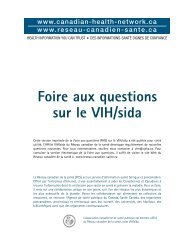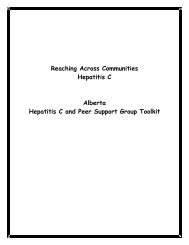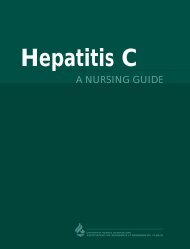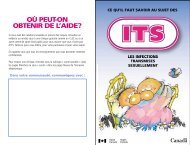A Guide to Primary Care of People with HIV/AIDS - Canadian Public ...
A Guide to Primary Care of People with HIV/AIDS - Canadian Public ...
A Guide to Primary Care of People with HIV/AIDS - Canadian Public ...
You also want an ePaper? Increase the reach of your titles
YUMPU automatically turns print PDFs into web optimized ePapers that Google loves.
A <strong>Guide</strong> <strong>to</strong> <strong>Primary</strong> <strong>Care</strong> <strong>of</strong> <strong>People</strong> <strong>with</strong> <strong>HIV</strong>/<strong>AIDS</strong><br />
Chapter 6: Metabolic Complications <strong>of</strong> Antiretroviral Therapy<br />
CASES<br />
1.<br />
A 36-year-old <strong>HIV</strong>-infected man has received stavudine (d4T) plus lamivudine (3TC) plus indinavir (IDV)<br />
for approximately 4 years. This regimen was his first regimen and before starting therapy his <strong>HIV</strong> RNA<br />
was 59,000 copies/mL and his CD4 count was 34 cells/mm 3 . His antiviral and immunologic response<br />
has been excellent, <strong>with</strong> <strong>HIV</strong> RNA levels persistently less than 50 copies/mL and a CD4 count that<br />
has increased <strong>to</strong> 526 cells/mm 3 . In the past 9 months, however, he has developed hyperlipidemia,<br />
hyperglycemia, and body fat changes, most notably enlargement <strong>of</strong> his abdominal region and facial<br />
thinning. He has been very hesitant <strong>to</strong> change his regimen but now comes in<strong>to</strong> the clinic <strong>to</strong> discuss this<br />
matter again.<br />
Question: If he changes his antiretroviral regimen, will he likely continue <strong>to</strong> have excellent<br />
control <strong>of</strong> <strong>HIV</strong>?<br />
6<br />
Answer:<br />
Since this patient has experienced excellent long-term viral suppression and this was his first regimen, it<br />
is highly likely that a switch from a PI <strong>to</strong> a NNRTI (efavirenz [EFV] or nevirapine [NVP]) would maintain<br />
continued viral suppression. Similarly, a change from one NRTI <strong>to</strong> another would likely have no adverse<br />
affect on <strong>HIV</strong> suppression. In patients who have previously developed resistance and are currently on<br />
a salvage regimen, changing a medication because <strong>of</strong> side effects can pose a much greater risk <strong>of</strong> not<br />
maintaining excellent virologic control.<br />
Question: What improvements would he likely expect if he makes a change?<br />
Answer:<br />
Among the problems this patient has developed as a complication <strong>of</strong> ART, insulin resistance and<br />
hyperlipidemia are the most likely <strong>to</strong> improve <strong>with</strong> a regimen change. In particular, several studies have<br />
shown switching from a PI <strong>to</strong> either nevirapine, efavirenz, or abacavir (ABC) typically leads <strong>to</strong> significant<br />
improvement in hyperglycemia and insulin resistance. Improvements in lipids are most likely <strong>to</strong> occur if the<br />
PI is switched <strong>to</strong> either nevirapine or abacavir. Switching from one PI <strong>to</strong> the new PI atazanavir (ATV) may<br />
provide significant improvement in lipid abnormalities. Unfortunately, changing from a PI <strong>to</strong> an NNRTI<br />
has not produced reliable improvements in lipodystrophy. Changing from stavudine <strong>to</strong> either abacavir or<br />
ten<strong>of</strong>ovir (TDF) may provide some improvement in lipodystrophy for some patients. Although ten<strong>of</strong>ovir<br />
causes less lipodystrophy than stavudine, studies that examine the effect <strong>of</strong> changing stavudine <strong>to</strong><br />
ten<strong>of</strong>ovir have not been performed.<br />
U.S. Department <strong>of</strong> Health and Human Services, Health Resources and Services Administration, <strong>HIV</strong>/<strong>AIDS</strong> Bureau<br />
47

















